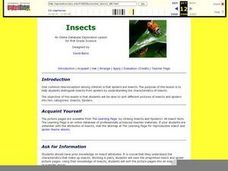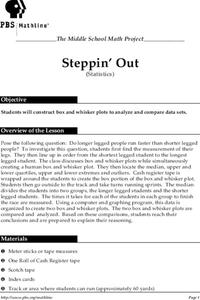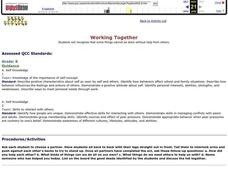Curated OER
Dot-Com Gives Small Investors a Leg Up
High schoolers explore the concept of investing in stocks. In this investing in stocks lesson, students discuss how on-line stock traders have helped people save money. High schoolers discuss ways in which companies can make a product or...
Curated OER
Science: How to Identify Insects
First graders discover how to distinguish spiders from insects by understanding the characteristics of each. They sort online picture pages into the two groups and examine the insects for common attributes. Students complete a worksheet...
Curated OER
Muscular Dystrophy: A Walk in Their Shoes
Health and biology learners wear five pound weights on their legs for 24 hours to simulate the extra effort required when people suffer from muscular dystrophy. They research the disability online and write about how it feels to "walk in...
Curated OER
Horses
Learners study horses' anatomy and movements. They explore the work of Susan Rothenberg, then create a print of a horse in motion. They study photos of horses and observe horses trotting and in other gaits to see how their legs move and...
Curated OER
Tarantulas!
Students research on the internet and study about the mysterious eight-legged arthropod, tarantulas. They apply what they've discovered to create a three-dimensional tarantula model with an imaginary, colorful and descriptive name given...
Curated OER
Crises in the Late Medieval Church
Corruption and power misuse about, the medieval church is on its last legs by the time this presentation is finished. Using inventive flow charts and maps to illustrate the growing crises between the church and medieval society, students...
Curated OER
Simple Repeated Addition
Here are five very cute and very basic examples of repeated addition. Little ones will count bunny ears, five pieces, crayons, and donkey legs in order to gain valuable repeated addition practice prior to learning about multiplication....
Curated OER
Addition Practice
Give your mathematicians a leg up on simple addition using this worksheet with visual aids. Similar to counting cubes, each single-digit addend is accompanied by a corresponding number of colored squares. The two colors are...
Bronx Zoo
How Animals Shape Up
Most drawings are comprised of a set of very basic shapes. Young zoologists examine the shapes that make up different animals they see at the zoo. They'll discuss the shapes that make up a head, body, and legs of an animal and then draw...
Curated OER
Steppin' Out
Students are presented with the question: "Do longer legged people run faster than shorter legged people?" Students conduct an experiment, collect their data, create box and whisker plots using a computer and graphing program, and...
Curated OER
What Makes a Dinosaur a Dinosaur?
Young scholars explore dinosaur stance and the dinosaur-bird connection. They investigate what distinguishes dinosaurs from other reptiles? Students discuss how dinosaurs stand their legs positioned directly under their bodies. They...
Curated OER
The Pony Express
Students plot the route of the Pony Express. They discover the kinds of terrain it crossed. They calculate the number of legs needed to cover the distance of its total route.
Curated OER
Exquisite Excursions
Young scholars locate 6 cities, one on each of the 6 major continents. They find distance for each leg of their journey, convert to percents, use a time zone map, and convert to foreign currencies.
Curated OER
Dissecting Crickets
Learners dissect a cricket and note the three body regions, wings, and legs. They observe the yellow malphigian tubes and remove them. They dissect the esophagus and analyze the heart for respiratory rates and heart beat rates.
Curated OER
Joints Help Us Move
Third graders investigate the three main types of joints in their arms and legs that are in charge of movement. In this human biology lesson, 3rd graders view x-rays online to see how different joints look, participate in exercises...
Curated OER
Ratios Involving the Hypotenuse
In this trigonometry worksheet, 10th graders calculate the ratios as it relates to the hypotenuse of the triangle. They find the missing leg, angle or hypotenuse. There are 6 questions with this worksheet.
Curated OER
Human Abstraction
Students explore and compare abstraction of human forms in various ancient cultures and by creating self-portraits using geometric shapes. They identify which geometric shapes form the following features: face, nose, arms, torso, legs,...
Curated OER
Working Together
Students sit back to back with their legs straight out in front. They interlock arms and push against each other's backs to try to stand up. They discuss things they can do on their own and what kinds of things we need others to help.
Curated OER
Pythagorean Theorem
Eighth graders draw right triangles and identify the parts of a right triangle: right angle, interior and exterior angles, hypotenuse and legs. They predict and identify any relationships that exist between the sides of a right...
Curated OER
The Pythagorean Theorem
Students create both a visual and formal proof of the Pythagorean theorem, as well as view four additional geometric demonstrations of the theorem. They construct a square and conjecture the following theorem: The sum of the areas of...
Curated OER
If I Had a Hundred
In this creative writing instructional activity, learners answer the questions provided, such as, "If I had 100 legs, I would..." All the story starters have the number 100 mentioned.
Curated OER
Vocabulary Skills
In this vocabulary worksheet, students read 10 idioms and math them with 10 keywords. For example, "Break a leg!" matches with "good luck for actors."
Curated OER
Basic Multiplication Facts Riddle 3
In this math worksheet, students solve 25 single-digit multiplication problems. Students use their answers to solve the following riddle: What did the leg bone say to the foot?
Curated OER
Geometry Course Review
For this geometry review set of worksheet, 10th graders solve and complete 139 various types of problems. First, they find the slope-intercept form of a line passing through a point and parallel to a line given. Then, students find the...
Other popular searches
- Bird Legs
- Counting Coins Using Legs
- Animal Legs
- Arachnids and Insects Legs
- Joanna Cole Bony Legs
- Coin Counting Legs
- Bony Legs by Joanna Cole
- Money Counting Legs
- Shoes Legs
- Coin Counting With Legs
- Bony Legs
- Insects Legs























